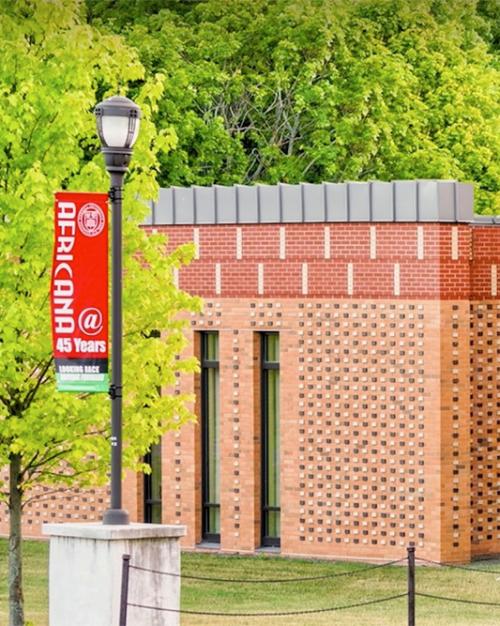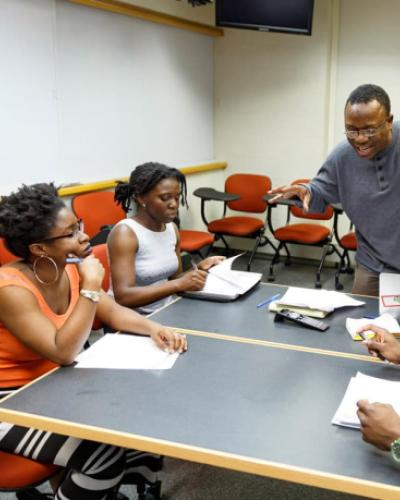The 54 ancient and modern languages offered at Cornell — including Indonesian, Polish and Arabic — provide students with opportunities to stretch their skills beyond the typical European languages taught in most high schools.
For some students, the language they choose to study is one they already know well – perhaps speaking it since birth. These students are called heritage language learners and there are classes in Spanish, Chinese, Korean, Arabic, Hindi, and Russian put together just for them. There are also heritage learners in other language classes, too.
Some are Chinese or Latin American students whose parents spoke only Spanish, Mandarin or other dialects at home, while others sign up for an African language their relatives speak fluently, but they don’t.
These language classes deepen their knowledge of the written and spoken language, as well as open their eyes to different dialects and colloquial words that vary by region or country. While they know that the language skills may benefit them in a future career, many students also take the classes to connect with family.
Elsie Ikpot ’16 studied Spanish in high school, but when she learned she could take Yoruba at Cornell, she signed up second semester of her freshman year. Three semesters later, she earned a Fulbright fellowship to study in Nigeria for eight weeks and formed some of the closest friends of her life.
“At first I was so afraid that I would make a mistake, but that experience made me feel confident and empowered,” she said. “I visited my grandmother (after learning more of the language) and she was so surprised.”
Students in Frances Yufen Lee Mehta’s heritage Chinese classes often have good oral skills, but are lacking in other areas, particularly writing and reading. Several of her assignments strengthen their skills by writing letters to their parents and other family members.
“Many of the poems my students learn are songs in China, Taiwan and other Chinese-speaking areas,” said Mehta, a senior lecturer in the Department of Asian Studies. “When they share them with their parents, they say ‘Oh, I know how to sing those songs.’ “
Heritage speakers face varied challenges
Mehta said teaching heritage speakers is something like filling in holes in a piece of Swiss cheese. All of the students have different areas of strengths and weakness –in reading, writing, pronunciation, vocabulary or other areas — so classes need to address many facets of language learning.
Most of her beginning heritage students can speak conversationally, but mostly with a child’s vocabulary focused on food, home life and other everyday language. And many of her students know a few Chinese characters, but not many.
One of the textbooks they use, written by Mehta, teaches them 500 characters within the first two semesters to enable them to transcribe in characters. Coupled with assignments, presentations and class discussions, that work activates students’ latent knowledge, Mehta said, and helps them gain confidence to explore current events, culture, social issues and other academic topics in Chinese.
“I lived in a Mandarin-speaking household until about 4th grade, when I moved in with my mom and stepdad (who spoke primarily English),” said James Wu ’17. “I decided that I really needed to maintain my Chinese in college because if I wanted to do business or travel in China then it’d be very beneficial to know Chinese. Plus, I could understand my extended family more when I visit.”
Billie Sun ‘19 had the opposite problem – her Chinese reading and writing skills were good since she took Chinese throughout high school, but her oral skills were lacking because although her parents spoke to her in Chinese growing up, she would always answer in English.
The classes have allowed her to connect with her extended family on many levels, she said. “I think a lot of my family's humor is kind of Chinese-language-centric, so the language brings us all closer together in that respect.”
Abram Ablesiou’s parents spoke in English to him when he was growing up in Nigeria, but when they moved to the states when he was 5, they started speaking to him only in Yoruba so that he could maintain the language.
That strategy worked, for the most part – he could understand his mom easily. But when it came time to answer or to read and write in the language, it was a struggle.
“My parents were pretty surprised that I could take classes in Yoruba here,” he said. “Now I am more confident that I can communicate with them on a deeper level.”
Kevin Alyono ’16 realized he had large vocabulary gaps when he tried to explain his environmental science major to his mother and other relatives.
“I moved from Jakarta when I was 7 years old, so I had a good grasp of the Indonesian language. But I slowly lost it because the only person I would talk to in Indonesian was my mom and she was a single mom who worked all day,” he said.
Attending a Johnson Museum exhibit and hearing the Gamelan Ensemble brought back memories of his childhood, Alyono said, and Chris Miller, music professor and ensemble leader, encouraged him to take his class, which led to a class in Indonesian, another class in Southeast Asian studies and intensive summer studies in the country.
Writing and vocabulary are also the main challenges for students in Munther Younes’ Arabic classes.
“Many students have taken classes for religious purposes so they know a little about reading and speaking, but they have no grammar,” he said, adding that two of the eight students in his class this semester had never seen Arabic letters before.
The progress after one semester can be surprising, though, said Younes, a senior lecturer in the Department of Near Eastern Studies.
“I can read most words and understand them now and I can write small, simple passages,” said David Labib ‘20, who was born in Egypt but immigrated to the U.S. when he was 10. “This is a huge stride from where I started, considering that in August I didn’t even know the letters of the alphabet.”
One language, many dialects and pronunciations
Along with heritage language classes, Cornell students can also practice their family language skills in Foreign Language Across the Curriculum (FLAC) classes. These one-credit classes are attached to a “parent” class in some discipline, where all the discussion is in a foreign language.
One interesting conundrum students and faculty face in these classes is that although they all speak the same language, there can be vast differences in accents, pronunciations and word choice based on their native country or region.
“When we first began meeting, we found it hard to even understand each other,” said Alina Amador Loyola, a student from Puerto Rico who’s enrolled in a FLAC discussion section this semester that accompanies a course on Latin American politics, one of seven FLAC courses offered this semester. Students in the class are from Peru and Venezuela, as well as a host of Latin American countries and Mexico.
“Faculty who teach heritage speakers must be respectful of the dialectal differences they will encounter,” said Nilsa B. Maldonado Mendez, visiting senior lecturer in the Department of Romance Studies who teaches Spanish to heritage speakers. “After all, we’re talking about 20 nations, each with its own history and influences from regional indigenous people, different accents and even uses of certain verb tenses.”
Linguistics Professor Wayles Browne said his language classes prepare students to communicate in academic and formal settings, even if those pronunciation and word usage rules might go against the ones they picked up from their parents. Browne has taught heritage speakers in Polish and Bosnian-Serbian-Croatian and has done independent studies with students wanting to learn Czech, Slovak, Macedonian, Ukrainian and other languages.
He said these heritage classes sometimes provide opportunities for alternate learning depending on the state of international affairs – and they can create opportunities for relationships that transcend borders.
“When Yugoslavia broke into separate warring countries in 1990-91, I was worried that students of one ethnic origin would feel hostile to those of another but it never happened. In fact, a Serbian descendant in one of my classes might have a young Bosnian as his best friend.”
Ewa Bachminska, a senior lecturer in Polish, said Cornell offers many opportunities for collaboration for professors teaching global topics like languages.
“Every elementary Polish class gets a presentation of Polish poster art at the Johnson Museum of Art,” she said, and her students have also benefitted from presentations by faculty and students in the music department and staff in Cornell’s Wellness Program, which taught her students how to make pierogi.
“Instruction and FLAC-type practice in a heritage language are wonderful experiences for heritage speakers,” said Dick Feldman, director of Cornell’s Language Resource Center. “At the same time that their increased language skills help them relate more meaningfully to their families and communities, the more professional nature of those skills give them study and employment opportunities they never had before.”





